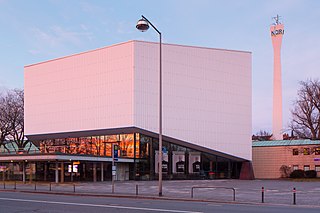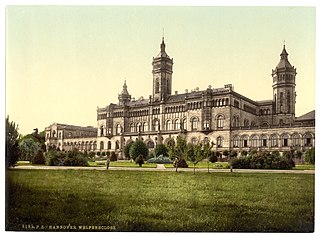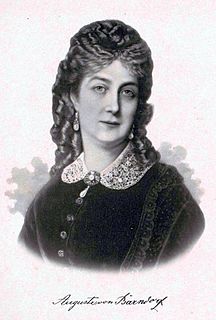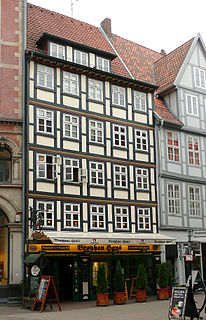Related Research Articles
Hermann Bahlsen was a German entrepreneur in the food industry as well as the inventor of the Leibniz butter biscuit and founder of the Bahlsen confectionery factory.

The Old Town Hall is a former, and the first, town hall in the German city of Hanover. Originally built in the old city district in 1410, replaced by the New Town Hall in 1913, and extensively restored in 1953 and 1964 after heavy bomb damage in World War II, it is the oldest secular building in the city. The market façade with the highly sophisticated Brick Gothic of the lucarnes has been preserved and partly restored in its medieval shape. Some elements of it were copied on other wings of the building.

Landesfunkhaus Niedersachsen is a group of buildings of the public broadcaster Norddeutscher Rundfunk in Hanover, the state capital of Lower Saxony.

Hanover Drama is a theatre company in Hanover, the state capital of Lower Saxony, Germany. The company is resident at the Hanover Playhouse situated approximately 200 metres (660 ft) east of Hanover Opera House, and the Ballyard situated approximately 530 metres (1,740 ft) west-southwest of the opera house in the old town. Collectively these venues have five stages:
Heinrich Lutter was a German pianist and piano educator.
Hugo Thielen is a German freelance author and editor, who is focused on the history of Hanover, the capital of Lower Saxony, in a lexicon of the city, another one especially of its art and culture, and a third of biographies. He co-authored a book about Jewish personalities in Hanover's history.

Klaus Mlynek is a German historian and scientific archivist. The long-term director of the Stadtarchiv Hannover is one of the editors and authors of the Hannover City Lexicon , an encyclopedia of Hanover.
Waldemar R. Röhrbein was a German historian. He worked as a museum director in Lower Saxony, his last post being from 1976 to 1997 at the Historisches Museum Hannover, and was president of the Homeland Federation of Lower Sachsony. He contributed to encyclopedias about Hanover's history and culture.

Hanover Historical Museum is an historical museum situated in Hanover, the capital of Lower Saxony, Germany. The museum was founded in 1903 as the Homeland Museum of the City of Hanover. Its collections are related to the history of the city, the history of the governing House of Welf, and of the state of Lower Saxony.
Dirk Böttcher was a German printer master, author and president of the association of Friends of the Historisches Museum Hannover.
Otto Ebel von Sosen was a German musician, conductor and composer.
Gotthard Kronstein was a German operatic baritone and theatre director.
Greta Hofer, néeGreta Köhler, pseudonym Greta Colere was a German opera singer.

Reimar Dahlgrün was a German pianist, professor at the Hochschule für Musik, Theater und Medien Hannover and journalist.

Christian Heinrich Tramm was a German architect who, in 1850, introduced the Rundbogenstil in Hanover.

Ernst Friedrich Hieronymus Ebeling was a German architect and building official.

The Theater am Aegi is an event venue on Aegidientorplatz square in Hannover, the capital of Lower Saxony, Germany. Like the square, it is often referred to as Aegi. The building was opened in 1953 mainly as a cinema, with a versatile stage also for other performances. It has been a Gastspieltheater for local and touring companies, without its own personnel. After a fire, it was rebuilt as a theatre only, opened in 1967, and then mainly as a venue for drama performances of the state-run Staatstheater Hannover. After a new theatre was built for that company in 1992, Theater am Aegi returned to its traditional role of a venue for various events, including congress, private functions and representation of the city.
Adolf Falke was a German architect, draughtsman, designer, stage designer and municipal politician.

Auguste von Bärndorf was a German stage actress.

The Broyhanhaus is a residential and commercial building built in 1576 in Hanover's historic old town or Altstadt. The building is standing on the cellar walls of a previous building from the 14th century and is the second oldest preserved half-timbered building in Hanover. The house is named after the brewer Cord Broyhan who lived there since 1537.
References
- 1 2 Böttcher, Dirk; et al. (2002). Hannoversches biographisches Lexikon. Von den Anfängen bis in die Gegenwart [Hannover Biographical lexicon. From the beginnings into the present] (in German). Hannover: Schlütersche. p. 9. ISBN 9783877067062. OCLC 231977507 . Retrieved 29 August 2022.
- ↑ Knocke, Helmut; Thielen, Hugo (2007). Böttcher, Dirk; Mlynek, Klaus (eds.). Hannover: Kunst- und Kultur-Lexikon [Hannover Artistic and Cultural Lexicon] (in German) (4th ed.). Springe: zu Klampen. ISBN 978-3-934920-53-8. OCLC 254024316 . Retrieved 29 August 2022.
- ↑ Mlynek, Klaus; Röhrbein, Waldemar R., eds. (2009). Stadtlexikon Hannover: Von den Anfängen bis in die Gegenwart[Hannover City Lexicon. From the beginnings into the present] (in German). With Dirk Böttcher and Hugo Thielen. Hannover: Schlütersche. ISBN 978-3-89993-662-9. OCLC 458691668.